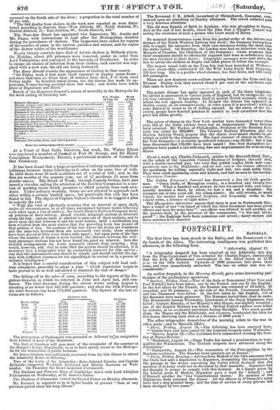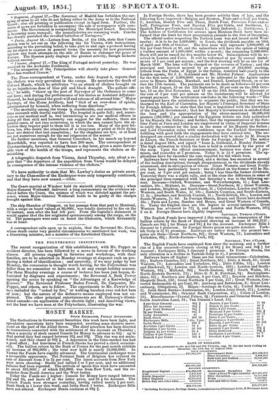POSTSCRIPT.
SATURDAY.
The first blow has been :struck in the fialtic, and the,Bomarsund is in the hands of the Allies. The interesting intelligence was published tlaia afternoon, in the following form.
"Admiralty, August 19.
"A telegraphic despatch has been received at the Admiralty this day from the Flag-Lieutenent of Vice-Admiral Sir Charles Napier, announcing that the forts of Blimaraund surrendered to the Allied forces at 12.30 p.m. on the 16th instintt. -Upwards of 2000 prisoners laid down their arms, and were immediately embarked. The loss oh either side was in- considerable."
An earlier despatch, in the liforning Herald, gave some interesting
embus of the preliminary operations ,
"Bantzie, Friday Noon.-Two of the forts at Bomarsund [Fort Tzee an Fort Nottich) have been taken, one by the French and one by the English.
In the fort taken by the French, the Russian loss consisted of 50 killed, 20 wounded, and 35 prisoners; on the side of the French, Lieutenant Noulfe and two Chasseurs were killed. In the fort taken by the English, 116 of the Russians wore made prisoners. The Russians buried their dead in casks. The Honourable George Wrottesley, Lieutenant of the Royal Engiueere;.wa killed ; Captain Ramsay, of her Majesty's ship Hogue, was slightly wounded ; one of the English Marines was killed, Severel,French soldiers were killed
by mistake' in an accidental encounter during Outright. Two screw guard- ships, the Hogue and the Edinburgh, and steamers' bombarded the forts for five hours, throwing their shot at a distance of 3000 yards."
The other telegraphic despatches of the morning relate to the war in other parts ; and to Spanish affairs.
"Paris, _Friday, August 18.-The following has been received here. "'Orders have just been issued for the Austrian troops to enter Wallachia.' " Orsova, August 18.-The Austrians. have commenced crossing the fron- tier at Turnu-Severin.'
"'Bucharest, August 14.-Omar Pasha has issued a proclamation to tran- quillize the Wallachians. The Turkish outposts have advanced along the J alomnitza.'
" Czernowitz, August 16.-The evacuation of the Principalities by the Russians continues. The Russian head-quarters are at Ismael."'
"Paris, Friday Evetaing.-Advices from Madrid of the 14th announce that the Clubs had sent a deputation to Espartero, demanding the suppression of
the passage in the decree convoking the Cortes which declared that the question of dynasty could not be discussed by that Assembly. Espartero had not thought it proper to comply with this demand. At a dinner given by the Liberal press of Madrid, Espartero gave a toast for Liberty '; and O'Donnell another for Our Constitutional Queen.' No member of the Diplomatic Body attended the dinner. All the officers in O'Donnell's army have had a step granted them, and the time of service of every private bas been abridged by two years."
it Bayonne, August 17.-The Governor of Madrid has forbidden the car- rying of arras to all who do not belong either to the Army or to the National iGuard ; also all printing or publication except in legal form. Further, the criers of news are forbidden to accompany the sale of newspapers with com- menu. The Government is reorganizing the Municipal Guard. Barcelona is becoming more tranquil; the manufactories are resuming work. Concha has sharply punished the revolted battalion of Tarragona." "Pars, August 18.-Letters from Berlin, of the lath, state that Comte Arnim was to set out on the following day for Vienna, with instructions, according to the prevailing belief, to take part in and sign a protocol having for its object to express in general terms the necessity for new guarantees against any fresh attempts on the side of Russia to endanger the peace of Europe. The Russian party displays the greatest activity, though hitherto without success." 6' Vienna, August 17.-The King of Portugal arrived yesterday. He was received by the Archduke Ferdinand.
"The occupation of the Principalities will shortly take place. General Has has reached Cracow."
The Times correspondent at Varna, under date August 4, reports that the cholera was very prevalent in the camps. He mentions the death of Colonel Manic, which he attributes "to an attack of cholera brought on by an injudicious dose of blue pill and black draught. The gallant offi- cer," he adds, "threw up the post of Surveyor of the Ordnance to come out here' and during the performance of his duties as Assistant Adjutant- General, he had gained the good-will and esteem of all around him." Major Levinge, of the Horse Artillery, had "died of an over-dose of opium, administered by himself, when suffering from diarrheas."
"The mortality among the troops is considerable, and sometimes the vic- tims succumb with fearful rapidity. The hospital is quite full; and, nume- rous as our medical staff is, and unremitting as are our medical officers in doing all that skill and humanity can suggest for the sufferers, there are painful cases, of not rare occurrence, in which the men cannot have the at- tention they require paid to them till it is too late. Many of the poor fel- lows, too, who desire the attendance of a clergyman or priest at their dying hour are denied that last consolation; for the chaplains are few, or at least are not numerous enough for the sad exigencies of the season."
lie further mentions, that General Canrobert, in his march up beyond Bazardshik, was reported to have lost 200 men. The correspondent at Constantinople, however, writing thence a day later, gives a more favour- able view of the health of the troops, and represents the cholera as di- minishing.
A telegraphic despatch from Vienna, dated Thursday, sets afloat a re- port that "the departure of tie expedition from Varna would be delayed in consequence of the intense violence of the cholera."



























 Previous page
Previous page